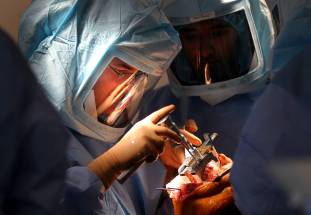An interim measure, but not a solution
Read this article for free:
or
Already have an account? Log in here »
To continue reading, please subscribe:
Monthly Digital Subscription
$0 for the first 4 weeks*
- Enjoy unlimited reading on winnipegfreepress.com
- Read the E-Edition, our digital replica newspaper
- Access News Break, our award-winning app
- Play interactive puzzles
*No charge for 4 weeks then price increases to the regular rate of $19.00 plus GST every four weeks. Offer available to new and qualified returning subscribers only. Cancel any time.
Monthly Digital Subscription
$4.75/week*
- Enjoy unlimited reading on winnipegfreepress.com
- Read the E-Edition, our digital replica newspaper
- Access News Break, our award-winning app
- Play interactive puzzles
*Billed as $19 plus GST every four weeks. Cancel any time.
To continue reading, please subscribe:
Add Free Press access to your Brandon Sun subscription for only an additional
$1 for the first 4 weeks*
*Your next subscription payment will increase by $1.00 and you will be charged $16.99 plus GST for four weeks. After four weeks, your payment will increase to $23.99 plus GST every four weeks.
Read unlimited articles for free today:
or
Already have an account? Log in here »
Hey there, time traveller!
This article was published 01/09/2022 (1194 days ago), so information in it may no longer be current.
Sending patients to Ontario and the U.S. should help clear Manitoba’s bulging surgical backlog. However, far more needs to be done to reduce the lengthy wait times thousands of Manitobans are now facing.
The province’s diagnostic and surgical recovery task force last week announced plans to send as many as 750 patients per year for hip and knee surgery to facilities in northwestern Ontario, North Dakota and Cleveland, Ohio. Task force chair Dr. Peter MacDonald said qualified candidates will have the option of applying to have their surgery performed out-of-province; the province will pay the cost of the surgery, travel and accommodations.
JESSICA LEE / WINNIPEG FREE PRESS FILES
The announcement is good news for those waiting months or years in pain and agony for surgery. However, it will only make a small dent in the massive surgical backlog created during the COVID-19 pandemic. Wait times for procedures such as orthopedic and cataract surgery were already long prior to the pandemic, owing in large part to austerity measures forced on regional health authorities by the Progressive Conservative government.
The pandemic made those wait times worse. Still, sending patients out-of-province will provide relief for hundreds of Manitobans. As an interim measure, it is the right thing to do.
Manitoba’s bigger challenge is to build capacity at home, including expanding the number of surgeries it can perform each year. That won’t be easy to do, given the severe shortage of nurses and anesthetists in the province, and indeed across the country. However, there are some immediate steps that could be taken to boost surgical capacity — measures on which the province is dragging its heels.
Manitoba’s bigger challenge is to build capacity at home, including expanding the number of surgeries it can perform each year.
Ophthalmologists at Misericordia Health Centre, where many of Manitoba’s cataract surgeries are performed, say they have the staff and resources to perform more surgeries. What they don’t have is the funding from the province. Manitoba Health is using a request-for-services model to fund surgeries that forces facilities, including public-sector ones such as Misericordia, to bid on surgical contracts.
There may be nothing wrong with that model during normal times; it could be a useful way to find efficiencies in the system. However, it’s causing delays in getting funding to where it’s needed. Given the urgency to reduce wait times, that funding should be expedited.
What also needs to be fast-tracked is a plan to expand orthopedic surgery at Concordia Hospital. An additional operating room was slated to open there by the end of the year, but that has been delayed. The expansion is expected to boost capacity by an additional 1,000 hip and knee surgeries per year. A new surgeon has been hired, and the province says it has the staff to provide the additional surgeries.
What also needs to be fast-tracked is a plan to expand orthopedic surgery at Concordia Hospital… The expansion is expected to boost capacity by an additional 1,000 hip and knee surgeries per year.
However, the new operating room now won’t open until March 2023 at the earliest. The province has provided little explanation for the delay, except to say its cause is the usual slowdowns in construction. Considering how long some Manitobans are waiting for hip and knee surgery, no effort should be spared to get this additional capacity in motion as quickly as possible.
The key to avoiding a similar health-care crisis in the future is for government to commit to long-term, sustainable funding for hospitals and surgical programs. One of the main reasons Manitoba has among the longest wait times in Canada is because of cuts and freezes to hospital budgets in recent years.
It’s time for government to acknowledge that. While the out-of-province surgery plan does have short-term merit, the simple fact of the matter is that Manitobans should not have to travel beyond our borders for basic medical care.









